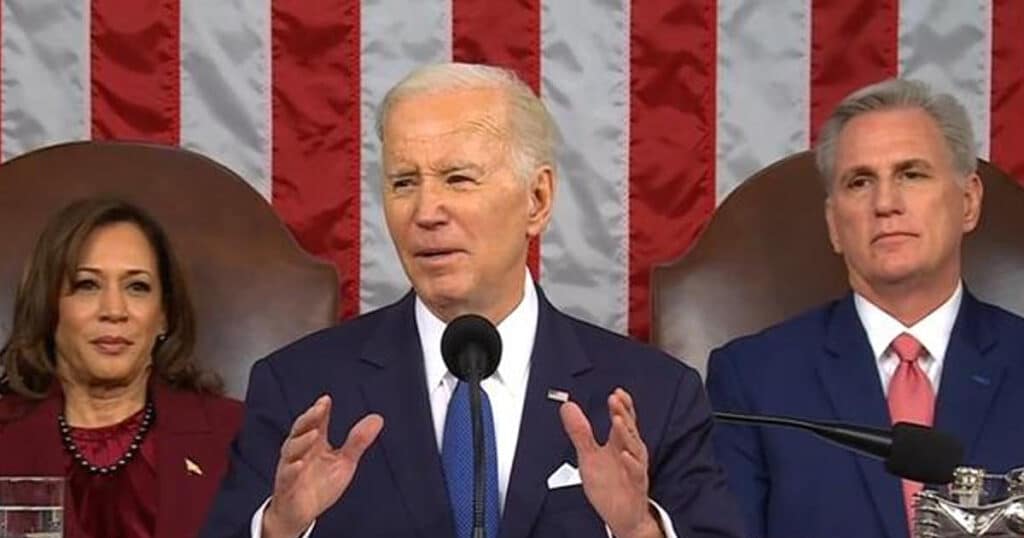
White House: Biden Can’t Negotiate Until GOP “Finish Negotiating With Themselves”
In public, President Biden is rather frustrated. More specifically, White House aides say he was disappointed to watch House Republicans leave Washington for a two-week recess without anything close to a budget resolution or a plan for avoiding a catastrophic default on the national debt.
The message from the White House to Republicans headed back to their districts is simple. The administration now says, in so many words, please stop squabbling so that, by the time you return, we can begin hammering out a deal.
It is a critical first step. “House Republicans can’t negotiate the budget with President Biden,” White House spokesman Andrew Bates told RealClearPolitics, “until they finish negotiating with themselves.”
“Once they get their act together and remove the prospect of a default, and submit a budget,” the spokesman added, “we can have a full conversation about spending priorities.”
Biden knows firsthand how messy and occasionally maddening budget negotiations can be in Congress, and there is perhaps a bit of partisan goading in that line from the White House. But even if the problem isn’t new, the issue remains serious. Lawmakers periodically must lift the debt ceiling, the statutory maximum that the federal government may borrow, to meet its obligations. Failure to do so means default, something that has never happened and experts warn would bring ruinous consequences.
House Speaker Kevin McCarthy says Republicans want to avoid such a scenario – but want something in return for lifting the debt ceiling: namely, spending cuts.
The White House has refused to haggle over cuts and the debt ceiling concurrently but says that the president remains “eager to negotiate” with McCarthy. They would just like to see a budget proposal first, something conservatives haven’t yet provided. Biden already has one that is “deficit-cutting,” Bates said, pointing to a proposal the White House released last month.
“But weeks after the president released his deficit-cutting budget,” the spokesman added, “House Republicans left Washington for a two-week recess without submitting their own.”
After RCP requested comment, McCarthy tweeted a message to Biden, currently en route to Minnesota. “President Biden,” he wrote, “rather than spend 6 hours on a plane for a campaign-style event today, you should meet with me to address America’s runaway spending and a responsible debt ceiling increase. I’m ready. Let’s get to work to Limit Spending, Save Taxpayer Money, & Grow the Economy.”
After slamming the White House for position of “a blank-check debt limit increase and a blanket refusal to negotiate,” McCarthy spokesman Chad Gilmartin insisted Republicans were the ones left waiting.
“The American people know Democrats harmed our economic future with their reckless spending, and have made it abundantly clear that they expect us to negotiate a solution to get things under control,” he told RCP. “The speaker remains ready to do that in a reasonable and responsible way – we’re just stuck waiting on the White House to get in the game.”
A still new Republican majority is off to a comparatively slow start in the House, at least when it comes to the nation’s finances. A raucous fight on the House floor over who would be speaker took a week, and then in the next three months, Republicans blocked a new crime bill for the District of Columbia, sent legislation to the president’s desk forcing an early end to the pandemic emergency declaration, and launched oversight investigations into the Biden administration and the Biden family’s business dealings.
McCarthy urged Biden to abandon his non-negotiation stance on the debt limit, calling such a stance in a letter last week “extreme.” The two men met in the Oval Office two months ago, and while they agree that cuts to Social Security and Medicare are off the table, there is little room for agreement so far. McCarthy has proposed reducing nondefense spending to “pre-inflationary levels” and clawing back unspent coronavirus relief funds.
“It’s time to drop the partisanship, roll up our sleeves, and find common ground on this urgent challenge,” McCarthy wrote, asking the White House to reach out to his team by the end of the week. Afterward in an appearance on MSNBC, the usually upbeat McCarthy sounded dour. “We’ve made no progress,” he said. “I’m always an optimist. I’m not now.”
The Washington Post now reports that House Republicans “have hit the pause button” on an early-January agreement that sought to balance deficits while also tying the debt ceiling to spending cuts. The White House would very much like to point to that delay as evidence Republicans are focused on the wrong thing at the wrong moment.
All parties agree that time is running out to make a deal on the debt ceiling, even as the precise deadline is uncertain. Treasury Secretary Janet Yellen will not know the exact date for when the federal government can no longer meet its obligations until total revenues are calculated after tax season wraps up later this spring. A rough approximation of that moment, reportedly called “the X date,” is sometime this summer.
The White House points to the warnings from business leaders urging Republicans to start their work, and the administration warns that “now is the worst time to play games with the threat of an unprecedented default.” Raising the debt ceiling isn’t anything new, though. Congress has done it before. “As they did for the entire Trump administration,” Bates told RCP, “they need to raise the debt ceiling without preconditions, something Democrats crossed the aisle to help them do despite enormous disagreements on policy.”
The budget Biden released earlier in March called for a 25% minimum tax on wealthy Americans, among other new taxes, which his administration says would cut the deficit by $3 trillion over the next decade. When McCarthy received that proposal, he blasted it as “completely unserious.”
Biden said in his own letter to the speaker last week that he was willing to speak after the Easter recess but only if the GOP can bring a draft of their own budget to the meeting. “Separately, as you and I discussed earlier, I look forward to talking with you about our Nation’s economic and fiscal future,” he wrote. “But for that conversation to be productive, we should both tell the American people what we are for.”
Bates echoed that sentiment, telling RCP that conversation was “impossible” until Republicans “get to work” and “finish negotiating with themselves.” Then Biden’s spokesman took a swipe at the GOP, saying that they must be “transparent with the American people about the unaffordable tax welfare for the wealthy and the gut-punches to our competitiveness that they stand for.”
This article was originally published by RealClearPolitics and made available via RealClearWire.



